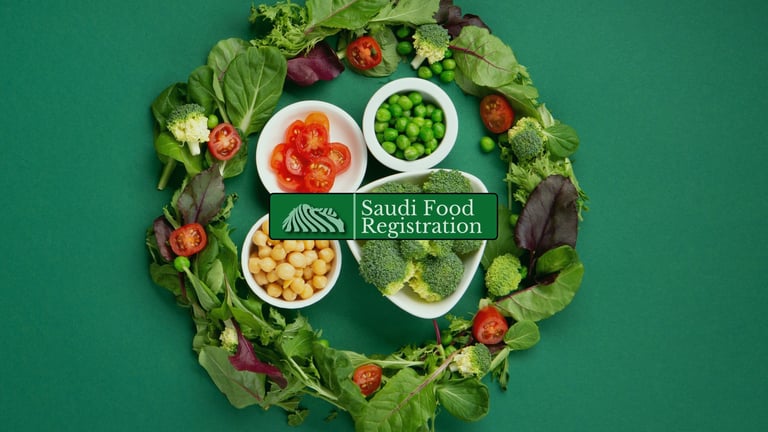Registering Alternative Proteins
Saudi Food Registration helps with SFDA compliance, Halal certification, and regulatory approvals for alternative Proteins and plant-based foods in the KSA.
1/24/20252 min read


Registering Alternative Proteins & Plant-Based Foods in Saudi Arabia
As consumer demand for alternative proteins and plant-based foods grows globally, Saudi Arabia is emerging as a key market for these innovations.
Driven by health-conscious trends, sustainability goals, and the Kingdom’s Vision 2030, businesses looking to introduce plant-based, fermented, or lab-grown foods must navigate a complex regulatory framework.
Ensuring compliance with SFDA regulations, Halal certification, and food safety standards is critical for market entry and long-term success.
Understanding SFDA’s Regulatory Role in Alternative Proteins
The Saudi Food & Drug Authority (SFDA) is responsible for regulating alternative proteins and plant-based food products to ensure consumer safety and product integrity.
Companies must adhere to strict requirements covering:
1. Ingredient Approval & Novel Food Registration
Products using new or unfamiliar ingredients, including lab-grown proteins, require scientific validation and safety assessments before being approved for sale in Saudi Arabia.
SFDA evaluates these based on international standards and risk assessments.
2. Labeling & Nutritional Claims Compliance
Products must meet Arabic labeling requirements, include clear nutritional information, and comply with SFDA’s restrictions on health claims.
Misleading or exaggerated benefits can lead to delays or rejections in the approval process.
3. Halal Certification for Alternative Proteins
Since Saudi Arabia follows strict Halal food guidelines, alternative protein producers must obtain certification from SFDA-recognized Halal authorities.
This applies to both plant-based meat substitutes and lab-grown proteins, ensuring that ingredients and processes align with Islamic dietary laws.
4. Import & Distribution Regulations
For imported alternative protein products, businesses must ensure compliance with SFDA’s import guidelines, including product testing, supplier verification, and approved distribution channels.
Failure to comply with these requirements can lead to shipment rejections.
Challenges in Registering Alternative Proteins in Saudi Arabia
Unclear classification for lab-grown & plant-based proteins
✔ Solution: Stay updated on SFDA’s evolving stance and seek regulatory consultation for accurate categorization.
Halal certification complexities for cultured meat & alternative proteins
✔ Solution: Partner with SFDA-approved Halal certification bodies to ensure compliance.
Lengthy approval timelines for novel food products
✔ Solution: Work with regulatory consultants to streamline documentation and fast-track applications.
Best Practices for SFDA Compliance
Conduct pre-market research to understand SFDA’s classification of alternative proteins.
Prepare comprehensive safety documentation covering ingredient sourcing, processing, and testing.
Obtain Halal certification early to avoid delays in market entry.
Ensure labeling compliance with bilingual (Arabic & English) content and accurate health claims.
Work with regulatory experts to navigate the SFDA approval process efficiently.
How Saudi Food Registration Can Help
Saudi Food Registration provides tailored support to businesses looking to introduce alternative proteins and plant-based foods to the Saudi market. Our services include:
SFDA Registration Assistance – Guidance through the regulatory approval process.
Halal Certification Support – Helping businesses meet Saudi Halal certification requirements.
Regulatory Compliance & Labeling Reviews – Ensuring product labels and documentation align with SFDA standards.
Related Reads
GCC Food Registration Made Easy – A step-by-step guide on navigating regulatory approvals across the GCC.
MRL Compliance in Saudi Arabia – Ensuring food safety by meeting Maximum Residue Limits in alternative protein products.
Avoid Costly Mistakes in 2025 – Key strategies to prevent regulatory setbacks in Saudi food product registration.
